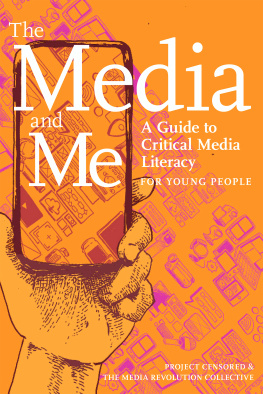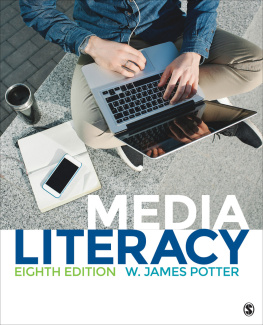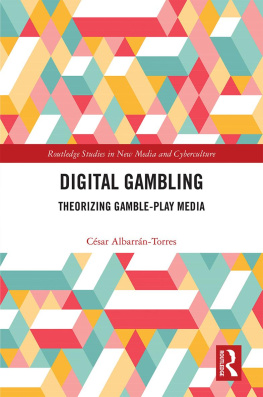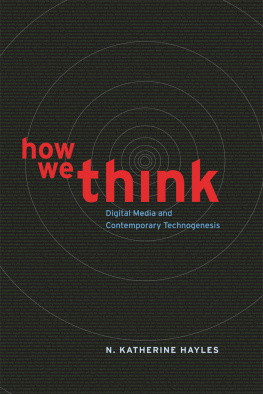
Identity and Play in Interactive Digital Media
Recent shifts in new literacy studies have expanded definitions of text, reading/viewing, and literacy itself. The inclusion of non-traditional media forms is essential, as texts beyond written words, images, or movement across a screen become ever more prominent in media studies. Included in such non-print texts are interactive media forms like computer or video games that can be understood in similar, though distinct, terms as texts that are read by their users. This book examines how people are socially, culturally, and personally changing as a result of their reading of, or interaction with, these texts. This work explores the concept of ergodic ontogeny: the mental development resulting from interactive digital media play experiences causing change in personal identity.
Sara M. Cole is a filmmaker and independent scholar. She teaches media and culture courses and makes low-budget movies in Baltimore, Maryland. Her newest class, The Language of Politics, will be offered through Osher at Johns Hopkins University in Spring 2017. Dr. Coles past publications address concepts of gender representation and connections between work and play.
Routledge Advances in Game Studies
1 Video Games and Social Competence
Rachel Kowert
2 Sexuality in Role-Playing Games
Ashley ML Brown
3 Gender, Age, and Digital Games in the Domestic Context
Alison Harvey
4 The Dark Side of Game Play
Controversial Issues in Playful Environments
Edited by Torill Elvira Mortensen, Jonas Linderoth, and Ashley ML Brown
5 Understanding Counter play in Video Games
Alan F. Meades
6 Video Game Policy
Production, Distribution, and Consumption
Edited by Steven Conway and Jennifer deWinter
7 Digital Games as History
How Videogames Represent the Past and Offer Access to Historical Practice
Adam Chapman
8 New Perspectives on the Social Aspects of Digital GamingMultiplayer 2
Edited by Rachel Kowert and Thorsten Quandt
9 Fans and Videogames
Histories, Fandom, Archives
Edited by Melanie Swalwell, Helen Stuckey and Angela Ndalianis
10 Identity and Play in Interactive Digital Media
Ergodic Ontogeny
Sara M. Cole
First published 2017
by Routledge
711 Third Avenue, New York, NY 10017
and by Routledge
2 Park Square, Milton Park, Abingdon, Oxon OX14 4RN
Routledge is an imprint of the Taylor & Francis Group, an informa business
2017 Taylor & Francis
The right of Sara M. Cole to be identified as author of this work has been asserted by her in accordance with sections 77 and 78 of the Copyright, Designs and Patents Act 1988.
All rights reserved. No part of this book may be reprinted or reproduced or utilised in any form or by any electronic, mechanical, or other means, now known or hereafter invented, including photocopying and recording, or in any information storage or retrieval system, without permission in writing from the publishers.
Trademark notice: Product or corporate names may be trademarks or registered trademarks, and are used only for identification and explanation without intent to infringe.
Library of Congress Cataloging-in-Publication Data
CIP data has been applied for.
ISBN: 978-1-138-22900-6 (hbk)
ISBN: 978-1-315-39078-9 (ebk)
Typeset in Sabon
by codeMantra
This book is dedicated to my siblings, Anna and John, who let me wake them up early on weekends to try to beat Zelda all in one go.
The ideas presented in the following chapters are the culmination of an investigation that began in 2010; they follow my research through the development of a new term that more fully encompasses the complexity of new media influences on identity. The literature included are those that informed my conceptions of interactivity, immersion, player agency, and ergodics during these years as I explored the varied disciplines that contribute to the field of video game studies and considered future directions of inquiry. The progression of my thoughts on these topics, my findings after conducting interviews with players, and reflexive critique of the research process are shared to suggest a view of interactive media theory that is informed by multiple analytical perspectives and values results on the individual level.
My first experiences of video game play occurred at other peoples homes on the Nintendo Entertainment System and Atari. Interactive digital play via these apparatuses was in mixed-gendered groups with content that challenged my previous (non-video game) play habits. Later games, such as Duck Hunt (1984) or Mortal Kombat (1992), engaged competitive thematic content that was absent from most of my other playtime. Early discourses of digital play, regarding the potential to try on new characters and identities, were part of the allure. This may have inspired an early curiosity for how this particular type of entertainment or creative practice provides social space for play by both male and female gamers. Yet, the dominant incentive for play was the desire to compete on an equal level with other players regardless of game content and narrative themes.
My first home video game experience was the computer game The Oregon Trail (1971), educational to an extent as the players motivation is to complete a journey west during the settling of the frontier, a simplified retelling/re-enactment of this time in American history. The predominantly text-based game requires decision-making regarding food, animal care, repairs to the wagon, and disease. Upon receiving a Super Nintendo, video games allure shifted from agentive choice (I did not appreciate games like Myst (1993) at the time of their release, for instance) to an almost obsessive desire for mastery and completion of levels of action with overarching story elements, but clear and attainable short-term goals. Games like Super Mario World (1990) and The Legend of Zelda: A Link to the Past (1991) met these desires for immediate reinforcement with longer-range narrative elements that correlated well with my other play habits, which relied heavily on storytelling and narrative imagination.
Though players may be unaware of the event of reading an interactive digital text, like a video game, in the same way they would consider the act of reading a book, magazine, or text-based information from the Internet on a computer screen, reading is still very much taking place. This is a specific kind of literacy that is even more deeply involved with identity and ideology construction due to immersion in the game world and a sense of personal agency during play. Video games represent the future of storytelling, changing the impact of cultural narratives in important ways through a process of learning and internalization of game content that alters players perceptions of self and reality.
Continued rigorous research of interactive media is necessary because of the speed at which technology changes its capabilities and the dominant nature of its format. It is how many people will tell, hear, and experience stories, culture, and values. I establish a theoretical and methodological approach that defines elements of what it means to play in this interactive digital format and study the influence of game-play on thought and behavior for an initial sample of interview participants. This book is intended for readers who work in the video game industry, media analysts looking for a more sophisticated appreciation of video games beyond mainstream celebrations and rejections, scholars looking for evidence of a more complex explanation of interactive digital play, mass media organizations searching for a means of concisely expressing the nuanced realities of the ways video games change individuals, and video game players, like me, who feel under- or misrepresented by one-sided analyses. Background information from past theorists and concrete examples are included for readers less familiar with the research topic to create an accessible text with a broader audience in mind.







